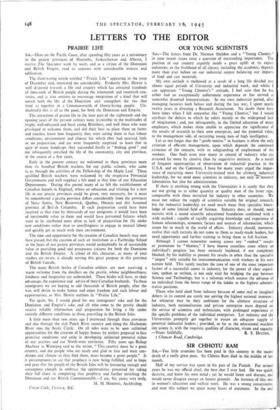PRAIRIE LIFE
LETTERS TO THE* EDITOR
Sta,—Here on the Pacific Coast, after spending fifty years as a missionary in the prairie provinces of Manitoba, Saskatchewan and Alberta, I receive The Spectator week by week, and as a citizen of the Dominion and British Empire, read its contents with considerable interest and edification.
The ilium' nuing article entitled " Prairie Lifc" appearing in the issue of December 2nd, interested me considerably. Evidently Mrs. Hewitt is well disposed towards a life and country which has attracted hundreds of thousands of British people during the nineteenth and twentieth cen- turies, and is also anxious to encourage emigration of a kind that will enrich both the life of the Dominion and strengthen the ties that bind us together in a Commonwealth of liberty-loving people. Un- doubtedly this is all to the good, for both the Dominion and Empire.
The attractions of prairie life in the later part of the eighteenth and the opening years of the present century were irr,:sistible to the multitudes of bright, well-educated and loyal young Britishers, and well those who were privileged to welcome them, and did their best to place them on farms and ranches, know how frequently they were asking them to face labour conditions, environment and climate for which they had received little or no preparation, and yet were frequently surprised to learn that in spite of many handicaps they succeeded finally in "Making good " and not infrequently enriched the life of the community, city and province, in the course of a few years.
Early in the present century we welcomed to these provinces more than six hundred British teachers for our public schools, who came to us through the activities of the Fellowship of the Maple Leaf. These qualified British teachers were welcomed by the respective Provincial Governments and well supplied a felt need at that time of our Education Departments. During this period many of us felt the establishment of Canadian hostels in England,. where an education and training for a new life in our prairie provinces could be given, very necessary, for it must be remembered a prairie province differs considerably from the provinces of Nova Scotia, New Brunswick, Quebec, Ontario and this favoured province of Brit'sh Columbia. If such preparation could have been received at that time by thousands of our emigrants it would have been of inestimable value to them and would have prevented failures which were to be attributed more often to lack of preparation for life under new conditions rather than to unwillingness to engage in manual labour and quickly get in touch with their environment.
The time and opportunity for the creation of Canadian hostels may now have passed, but the creation of such an institution as a Fairbridge School in the heart of our prairie provinces would undoubtedly be of inestimable value in providing good and prosperous citizens for both the Dominion and the British Empire. A school of this character, as many of your readers are aware, is already serving this great purpose in this province of British Canada.
The many British brides of Canadian soldiers are now receiving a warm welcome from the dwellers on the prairie, whose neighbourliness, kindness and hospitality are unbounded. These brides will have, to their advantage, the experience and advice of their Canadian husbands. To these immigrants we are hoping to add thousands of British people, after the war, will desire to make homes and enjoy freedom and such labour and opportunities, as Mrs. Hewitt outlines in " Prairie Life."
Yet again, Sir, I would plead for our immigrants' sake and for the Dominion and Empire's sake, and all who come to the prairie should receive reliable information and preparation for living a life under entirely different conditions to those prevailing in the British Isles.
A little more than two years ago I journeyed through these piovinces and also through the rich Peach River country and along the Mackenzie River into the Arctic Circle. On all sides were to be seen unlimited opportunities for the creation of happy homes by settlers prepared to face primitive conditions and unite in developing unlimited potential riches of our prairies and our North-west territories. Fifty years ago Bishop Machray in Winnipeg said to the writer, " This country must be a great country, and The people who are ready and glad to face and meet con- ditions and climate as they find them, must become a great people." Is it presumptuous to say that prophecy is now being fulfilled, and to hope and pray that the people of the British Isles will be foreseeing enough and courageous enough to embrace the opportunities presented for taking their full share in completing that prophecy and further enriching the Dominion and our British Commonwealth.—I am, Sir, yours very truly,
M. M. HARDING, Archbishop.
Union Club, Victoria, B.C.


























 Previous page
Previous page